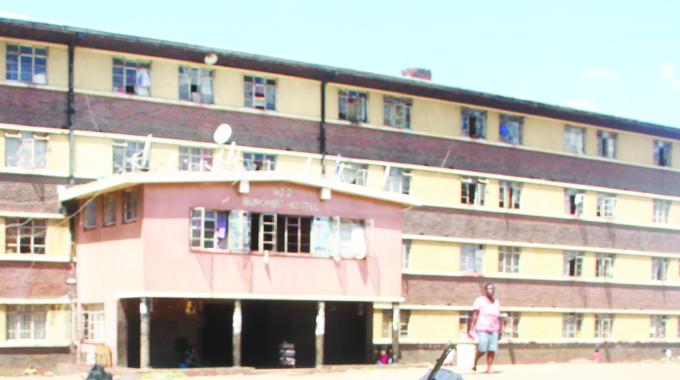The Chronicle

Mashudu Netsianda, Senior Reporter
BUROMBO Flats in Bulawayo, named after one of the country’s founding nationalists and a trade unionist who organised workers’ strikes against all forms of discrimination against blacks during the Rhodesian era, has significant history in the country’s fight for independence.
The Bulawayo City Council (BCC)-owned property, while having deteriorated over the years due to lack of maintenance, still tells a unique story of an outstanding pioneer freedom fighter.
The council has neglected this historically significant structure, which is visibly in a state of decay.
Coated in red dust and rust, with cracks on the concrete walls and peeling paint due to years of decay, the three derelict blocks of flats in Nguboyenja suburb are in urgent need of rehabilitation.
As one walks through the dark corridors, they are greeted a by foul smell with walls plastered with a thick layer of grime.
Several windowpanes are broken and residents have resorted to using cardboard and plastics to cover windows. In some entryways, a visitor is greeted by a stench emanating from bat droppings.
 Burombo Flat in Nguboyenja, Bulawayo
Burombo Flat in Nguboyenja, BulawayoThe structural decay is worsened by ageing water and sewer reticulation infrastructure as water easily seeps into homes when it rains and the dampness on the walls says it all.
Renowned historian, Mr Phathisa Nyathi, said Burombo Flats were named after Benjamin Burombo who was born in 1909 in Buhera, Manicaland Province, and died in 1959.
Being one of the earliest and most respected of the African nationalists in Zimbabwe, Cde Burombo came to Bulawayo in the early years of World War II and earned a living by selling biscuits in the railway compound.
“In 1947, Benjamin Burombo formed the British African National Voice Association (BANVA) during his stay in Bulawayo. His trade union movement took part in the defence of rural Africans who were facing evictions following the implementation of the 1930 Land Apportionment Act,” said Mr Nyathi.
“Burombo and his trade union movement worked tirelessly in Insiza District where whites returning from the Second World War (1939-45) were settling on the land and embarking on agricultural production.”
Although he never received any formal education, Burombo taught himself the rudiments of law by his own reading.
In 1948 he was largely instrumental in organising a countrywide strike that led to an urgent examination of wages by the Native Labour Board. He bitterly opposed the proposed Native Land Husbandry Bill, and when the Bill became law in 1951, he successfully challenged a number of cases where the Act had been wrongly implemented by native commissioners.
Burombo’s successes in this direction provided the inspiration for the next generation of nationalist leaders to mount a full-scale campaign against the Act in the late 1950s.
Mr Nyathi said when cattle were being culled, it took Burombo to campaign against the racist economically disempowering laws of Rhodesia.
“Burombo worked closely with the likes of Limu Sikhathi Mafu, son of the famous Chief Maduna of Godlwayo.
He is also remembered for his role in the landmark 1948 general strike, which was initiated by an umbrella body, Bulawayo Federation of African Workers Union whose leadership included the likes of Grey Mabhalane Bango,” he said.
Burombo’s death in 1959 came at the dawn of the birth and rise of African nationalism and his name was canonised through the construction of blocks of flats named after him.
Disgruntled residents living at Burombo Flats said they are fed up with the deplorable living conditions they are living under at the municipal-owned flats.
They implored the Government to intervene and address their plight following BCC’s failure to attend to their pleas.
“I came here in Bulawayo in the 1960s and worked in the industrial areas for 32 years until I retired. I stayed at Benjamin Burombo Flats since 1978,” said Mr Johannes Ncube, a resident.
“We are living under deplorable conditions and to us this place was named after a liberation icon yet it is not given the kind of respect it deserves.”
Ms Dorah Ndlovu, one of the few pioneer residents said: “When I came to stay here it was for a place reserved for bachelors. I was looking for accommodation and when I secured a place here albeit on a temporary basis. I was told to be on the waiting for accommodation, but until today is almost 50 years now I am still staying at Burombo Flats.”
Ms Ndlovu said the toilets were not working and for the past six months there has been no power.
“We are appealing to Government to intervene. As it is I live with my grand-children and we are forced to cram ourselves in a single room paying $1 000 to council for rentals,” she said.
When Chronicle visited the residential property, the news crew observed that some sections of the Burombo Flats have no running water and no electricity.
Bulawayo will be hosting this year’s 42nd Independence Anniversary Celebrations at Barbourfields Stadium, a short distance away from Burombo Flats.
This year’s Independence celebrations together with the Children’s Party will be held under the theme: “[email protected] 42- Leaving no one and no place behind.”
The theme dovetails with the Second Republic’s drive towards the promotion of national unity, devolution and decentralisation.
The Independence Flame will be taken from Khami Monument through Bulawayo suburbs on April 17 on its way to the Bulawayo Natural Museum of Zimbabwe.
It will pass through Nkulumane, Nketa, Emganwini, Tshabalala, Pelandaba, Pumula, Magwegwe, Gwabalanda, Luveve, Emakhandeni, Entumbane and then the city centre.
Article Source: The Chronicle
